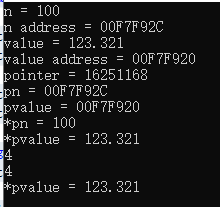
c++复杂数据类型——指针
发布日期:2021-05-15 08:56:37
浏览次数:24
分类:精选文章
本文共 2959 字,大约阅读时间需要 9 分钟。
指针存储和基本使用
int n = 100; float value = 123.321; cout << "n address = " << &n << endl; cout << "value address = " << &value << endl; long pointer = long(&value); cout << "pointer = " << pointer << endl; int* pn = &n; float* pvalue = &value; cout << "pn = " << pn << endl; cout << "pvalue = " << pvalue << endl; cout << "*pn = " << *pn << endl; cout << "*pvalue = " << *pvalue << endl; cout << sizeof(pn) << endl; cout << sizeof(*pn) << endl; cout << "*pvalue = " << *((float*)pointer) << endl;

指针移动和数据类型
int numbers[2] { 25,26};// int *numbers; numbers[0] numbers[1] cout << "numbers[0]=" << *numbers << endl; cout << "numbers[1]=" << *(numbers+1) << endl; char chars[2] { 25, 26}; cout << "chars[0]=" << int(*chars) << endl; cout << "chars[1]=" << int(*(chars+1)) << endl; void *p = numbers; // cout << "chars[1]=" << int(*(p+1)) << endl; // 报错,使用void* 接受无法分别指针类型,指针移动按照类型字节移动,int类型一次移动4个字节,指向下一个值 
指针初始化
int xyz = 30; int *p = &xyz ; cout << "p address=" << p << endl; p = &xyz; *p = 123; cout << "xyz = " << xyz << endl; // 123 xyz = 456; cout << "*p = " << *p << endl; // 456
动态创建数组
int n = 20; int *array3 = new int[n]; int *array4; array4 = new int[100]; delete [] array4; //array4 = NULL; // 0 array4 = nullptr; // c++ 11
字符串与指针
char str[10] = "hello"; cout << str << endl; char *p = str; cout << p << endl; p = new char[strlen(str) + 1]; strcpy(p, str); str[1] = 'x'; cout << str << endl; *(p + 2) = 'w'; cout << p << endl; char *p_str = "hello"; // 相当于指向常量字符的字符串指针,不能修改每一个字符 cout << p_str << endl; // *p_str = 's'; delete [] p; // delete [] p_str; delete p_str;
常量指针和指针常量
const int code = 1234; // 常量在定义时必须初始化 // code = 3; // error const int numbers[] = { 1,2,3,4}; // numbers[2] = 44; // error // 常量指针 const int *p = new int(100); // 常量指针通常在声明时初始化 cout << *p << endl; // *p = 333; char str[10] = "hello"; char const *p_str = str; // 指向字符串的常量指针不允许修改字符 //*p_str = 'a'; p_str = new char[6]; // 指针常量 const char * const p_str1 = str; //指针常量不允许修改字符,也不允许重新分配内存 // *p_str1 = '1'; //p_str1 = new char[3]; 用new创建结构体
struct MyStruct { int code; char *name; double price; }; MyStruct *p = new MyStruct(); p->name = new char[30]; strcpy(p->name, "iPhone6 plus 256G"); (*p).code = 1234; p->price = 9999; cout << "p->name = " << p->name << endl; //iPhone6 plus 256G cout << "(*p).code = " << (*p).code << endl; //1234 cout << "p->price = " << p->price << endl; //9999 用new创建共用体
union MyUnion { int code1; long code2; }; MyUnion *p = new MyUnion(); p->code1 = 200; cout << "p->code1 = " << (*p).code1 << endl; //200 cout << "p->code2 = " << (*p).code2 << endl; // 200 (*p).code2 = 400; cout << "p->code1 = " << p->code1 << endl; // 400 发表评论
最新留言
第一次来,支持一个
[***.219.124.196]2025年04月25日 00时40分14秒
关于作者

喝酒易醉,品茶养心,人生如梦,品茶悟道,何以解忧?唯有杜康!
-- 愿君每日到此一游!
推荐文章
MybatisPlus自定义Sql实现多表查询
2021-05-15
Java位运算,负数的二进制表示形式,int类型最大值为什么是2的31次方-1
2021-05-15
PyQt5快速上手基础篇10-QSettings用法
2021-05-15
JQuery--手风琴,留言板
2021-05-15
MFC 自定义消息发送字符串
2021-05-15
goahead 下goaction测试与搭建
2021-05-15
Adding Powers
2021-05-15
ideal 下创建springboot项目
2021-05-15
Linux操作系统的安装与使用
2021-05-15
ajax请求出现/[object%20Object]错误的解决办法
2021-05-15
流体运动估计光流算法研究
2021-05-15
如何转载博客
2021-05-15
C++ 继承 详解
2021-05-15
OSPF多区域
2021-05-15
Grafana导入 Promethus node模板
2021-05-15
如何提高SQL查询的效率?
2021-05-15
Docker入门之-镜像(二)
2021-05-15
数据结构——链表(3)
2021-05-15
socket模块和粘包现象
2021-05-15
Python学习--模块
2021-05-15